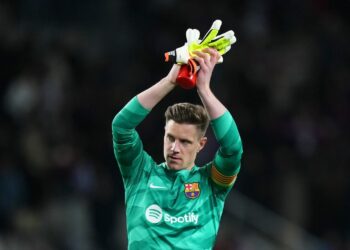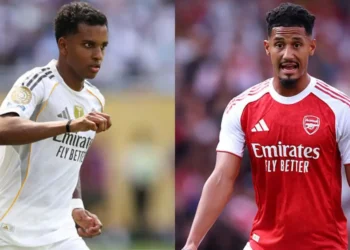The football world was rocked by an unexpected shift when Liverpool’s former assistant manager, Pepijn Lijnders, made the bold move to join Manchester City’s coaching staff. Known for his deep tactical understanding and profound influence on Liverpool’s successes under Jürgen Klopp, Lijnders’ decision to cross the divide to Manchester City, Liverpool’s arch-rivals, marks a significant moment in the world of football. While such moves are not uncommon in football’s ever-changing landscape, this one carries considerable weight, considering the magnitude of the clubs involved and Lijnders’ role in Liverpool’s rise to prominence.
Background: Lijnders’ Influence at Liverpool
Pepijn Lijnders is no stranger to success. A key figure in Liverpool’s coaching staff, Lijnders worked alongside Jürgen Klopp for years, contributing to the development of one of the most potent tactical setups in European football. Initially joining Liverpool as a first-team coach in 2014, Lijnders worked under Klopp during the German manager’s early years, quickly establishing himself as an integral part of Klopp’s inner circle. His tactical insight, especially in terms of pressing and quick transitions, became a hallmark of Liverpool’s aggressive and high-energy style of play.
Lijnders’ role evolved over the years, and in 2018, he was appointed as the assistant manager, contributing significantly to the club’s 2019 UEFA Champions League triumph and its subsequent Premier League title in 2020. During this period, Lijnders helped build a highly successful coaching framework that emphasized not only the intensity of play but also the importance of player development and psychological resilience. His influence on players like Mohamed Salah, Sadio Mané, and Roberto Firmino, and his work on shaping Liverpool’s renowned high press, helped elevate the team to new heights.
In addition to his tactical acumen, Lijnders also gained a reputation as a brilliant motivator and a coach who fostered a sense of unity and togetherness within the squad. His ability to communicate complex ideas simply and effectively earned him respect both on and off the pitch.
The Move to Manchester City
Lijnders’ departure from Liverpool shocked many. However, his move to Manchester City, Liverpool’s Premier League rival, raises eyebrows even further. Manchester City, under Pep Guardiola, has been the dominant force in English football for the past decade, and their tactical approach is often considered the gold standard in modern football. Lijnders, who shares a similar tactical philosophy centered around possession-based football, rapid transitions, and high pressing, is a perfect fit for Guardiola’s system.
The appointment of Lijnders at Manchester City adds a fresh layer of intrigue to their already formidable coaching staff. Guardiola’s setup at City has often been lauded for its fluidity and intensity, and Lijnders’ background with Klopp suggests that he can bring a new dimension to City’s already potent attack. His deep knowledge of pressing and his ability to break down defensive systems will be a valuable asset to Guardiola as he looks to further strengthen City’s hold over English football.
Lijnders is also known for his innovative approach to training and player development. While Guardiola has been synonymous with meticulous tactical planning, Lijnders’ creative methods and focus on intensity in training will likely complement City’s existing training regime, ensuring that the squad maintains its edge. Moreover, his experience at Liverpool in high-stakes matches, particularly in European competition, could prove invaluable as City continues to chase the holy grail of the Champions League, a title that has so far eluded Guardiola’s tenure.
The Rivalry: Liverpool and Manchester City
Liverpool’s rivalry with Manchester City has been one of the defining narratives of English football in recent years. With both teams challenging for supremacy in the Premier League, the arrival of Lijnders at Manchester City is bound to intensify the relationship between the two clubs. While the move may be seen as a personal career advancement for Lijnders, it also sends a message to Liverpool fans who may view this transition as a betrayal. Such high-profile transfers between rival clubs can leave a lasting impact on a manager’s reputation, especially when the move is as significant as Lijnders’ shift from one of Liverpool’s most important figures to City, a direct competitor.
However, in football, these types of moves are not entirely unprecedented. Guardiola himself worked with players and coaches who had previously been rivals, and his philosophy of collaboration rather than strict loyalty is something that has shaped his approach. This shift could be a testament to Lijnders’ desire for a new challenge and his ambition to further his career in the upper echelons of European football.
Conclusion: What This Means for the Future
Lijnders’ arrival at Manchester City is more than just a coaching change; it is a reflection of the evolving nature of football and its ecosystem. As clubs continue to improve and adapt to the ever-increasing demands of modern football, decisions like these highlight the fluidity with which coaching staff move between clubs. Lijnders’ experience and understanding of top-level football will only enhance Manchester City’s bid to remain at the top of English and European football.
For Liverpool, the departure of such a crucial figure presents a challenge in replacing a coach whose influence was central to their success. However, given the depth of their coaching staff and Klopp’s ability to adapt, Liverpool will likely remain a force in both domestic and international football.
For Lijnders, his move to Manchester City represents a bold step forward in his career, as he joins one of the most successful footballing projects in Europe. As he integrates into Guardiola’s team, football fans will be watching closely to see how this tactical partnership evolves and whether it has the desired impact on Ci
ty’s already impressive legacy.











